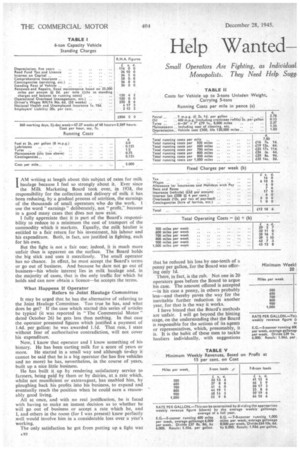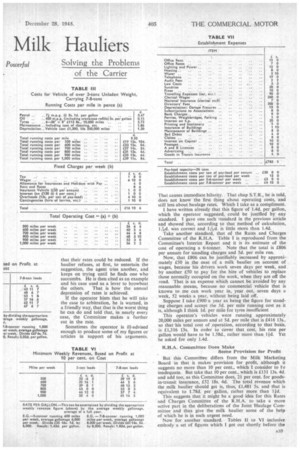Help Wanted Milk Hauliers
Page 34

Page 35

If you've noticed an error in this article please click here to report it so we can fix it.
IAM writing at length about this subject of rates for milk haulage because I feel so strongly about it. Ever since the Milk Marketing Board took over, in 1938, the responsibility for the collection and delivery of milk it has been reducing, by a gradual process of attrition, the earnings of the thousands of small operators who do the work. I use the word "earnings" deliberately, not "profit," because in a good many cases that does not now exist.
I fully appreciate that it is part of the Board's responsibility to reduce to a minimum the cost of transport of the commodity which it markets. Equally, the milk haulier is entitled to a fair return for his investment, his labour and his expenditure. Both, in fact, are justified in fighting, each for his own.
But the fight is not a fair one; indeed, it is much more unfair than is apparent on the surface. The Board holds the big stick and uses it mercilessly. The small operator has no chance. In effect, he must accept the Board's terms or go out of business. And because he dare not go out of business-his whole interest lies in milk haulage and, in the majority of cases, that is the only traffic for which he holds and can now obtain a licence-he accepts the terms.
What Happens If Operator Refers to Joint Haulage Committee It may be urged that he has the alternative of referring to the Joint Haulage Committee. Too true he has, and what does he get? If the case which started this series of articles be typical (it was reported in "The Commercial Motor" dated October 26) he gets less than nothing. In that case the operator presented figures which justified a payment of 1.4d. per gallon: he was awarded lid. That rate, 1 state without fear of authoritative contradiction, will not cover his expenditure, Now, I know that operator and I know something of his history. He has been carting milk for a score of years or more. He started in a small way and although to-day it cannot be said that he is a big operator (he has five vehicles and no more) he has, nevertheless, in the course of years, built up a nice little business.
He has built it up by rendering satisfactory service to farmers, being paid by them or by dairies, at a rate which, whilst not munificient or extravagant, has enabled him, by ploughing back his profits into his business, to expand and eventually reach the position when he could earn a reasonably good living.
All at once, and with no real justification, he is faced with having to make an instant decision as to whether he will go out of business or accept a rate which he, and 1, and others in the room (for I was present) knew perfectly well would involve him in a considerable loss over a year's working.
The only satisfaction he got from putting up a fight was




































































